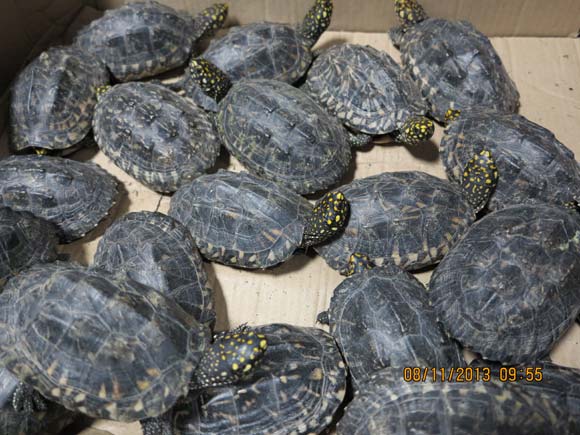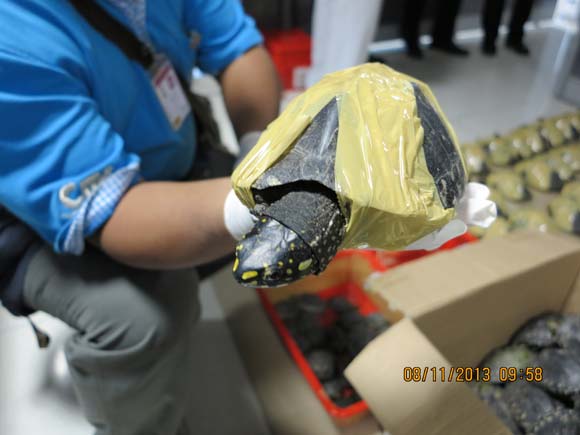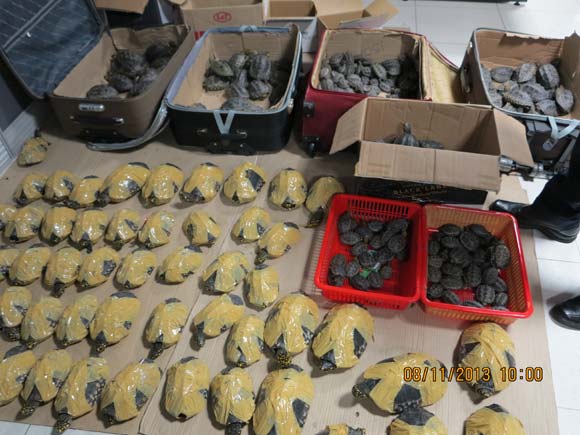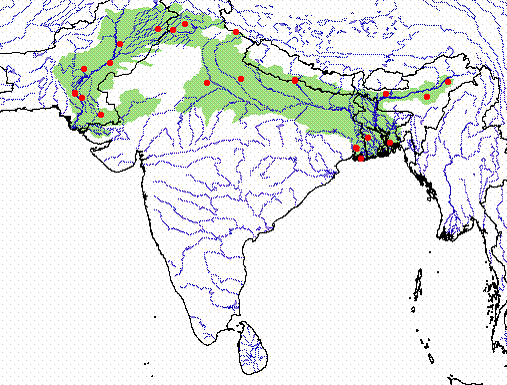It's Time To Save The Black Spotted Turtle
By Marianne Furtado de Nazareth
25 May, 2014
Countercurrents.org

Photo / By P Tansom / TRAFFIC
The attractive and rather riveting spotted visage of the Black Spotted Turtle( Geoclemys hamiltonii )may well be its downfall. The demand for them has shot up in the exotic pet market, and also for its meat and for the dodgy alternate medicine market as well. This has been found by TRAFFIC's (The wildlife trade monitoring network) research paper, which pins the sudden rise in demand to all these various reasons.
According to figures released by TRAFFIC, over 1,960 animals were seized between January 2008 and March 2014. Of these, 95 per cent were confiscated in the final 15 months of that period. A seizure of another 230 turtles on May 14th underscored the seriousness of the threat. Royal Thai Customs officers in Suvarnabhumi International Airport found the turtles packed in unclaimed bags which had come in on a flight from Kolkata, India.
Checking up on the seizure information, it indicates that shipments of the turtles from Bangladesh, India and Pakistan transit through South-east Asian hubs such as Bangkok and are destined for East Asia, in particular Hong Kong. Most of the seizures are from passengers using commercial airlines concealing animals in their baggage. The majority of couriers caught were arrested but only two of the 22 cases recorded resulted in successful prosecutions.
"Enforcement authorities' efforts to detect and apprehend smugglers are commendable, but a lack of follow-on investigations and prosecution is undoing their good work," said Dr Chris R Shepherd, Regional Director for TRAFFIC in Southeast Asia. "It is high time for wildlife criminals to be appropriately dealt with for the serious offences they are committing."

Photo / By P Tansom / TRAFFIC
The Black Spotted Turtle is protected under national laws in its range countries and is listed in Appendix I of the Convention on International Trade in Endangered Species of Wild Flora and Fauna (CITES). All commercial international trade in this species is illegal.
The report recommends improving enforcement and prosecution through multilateral and multi-agency coordination. Timely and detailed reporting of seizures to the CITES Secretariat and in the media, together with the outcomes of successful prosecutions, are also urged.
"Wildlife enforcement networks already exist in South and South-east Asia, but given the transnational operations of the criminal networks they are up against, the challenge is to ensure a fully co-ordinated global enforcement response to their activities is delivered," said Dr. Yannick Kuehl, Regional Director for TRAFFIC in East and South Asia
"TRAFFIC hopes our targeted analysis of trafficking routes will assist the region's Wildlife Enforcement Networks in planning enforcement actions aimed at breaking the lines of supply and demand," said Shepherd.
"Turtle species are seriously threatened - nowhere more so than in Asia with 17 of the 25 most critically endangered tortoises and freshwater turtles on the IUCN Red List found in the region," said James Tallant, Senior Programme Officer - Species, IUCN Natural Resources Group, Asia.

Photo / By P Tansom / TRAFFIC
"IUCN is working with partners across Asia, including TRAFFIC to stem the tide of biodiversity loss. It is very good to see the plight of turtle species being brought to international attention on World Turtle Day. We hope this leads to greater understanding and effective conservation action worldwide."
According to a paper by Chng, S.C.L (2014) called Escalating Black Spotted Turtle Geoclemys hamiltonii trade in Asia: a study of seizures Illegal international trade of the Black Spotted Turtle Geoclemys hamiltonii has escalated in the past two years.
Efforts supporting enforcement and prosecution are recommended in the following areas:
Regional cooperation across the eight countries of the South Asian Wildlife Enforcement Network (SAWEN) is recommended to raise awareness of this issue and address poaching and illegal export of Black Spotted Turtles, with specific priority in Bangladesh, India, Nepal and Pakistan.
Formal Memorandums of Understanding (MOUs) are strongly encouraged between governments of countries and territories along the trade route – Bangladesh, India, Pakistan, Thailand, Hong Kong, Taiwan – to improve cross-border enforcement. Regional platforms of SAWEN, the Association of Southeast Asian Nations Wildlife Enforcement Network (ASEAN-WEN) and INTERPOL should be utilized to catalyse and co-ordinate cross-border efforts to break down criminal networks.
Unique markings
The Black Spotted Turtle can be readily identified due to its unique markings. Customs officials and police officers can refer to identification guides for confirmation (such as the Species Identification Sheets available in different languages at http://www.asean-wen.org/index.php/factsheets/category/4-species-id). Greater vigilance at known gateways especially international airports in Dhaka, Bangkok and Hong Kong is required.
Any sale of this species outside range States violates CITES and perpetrators need to be punished accordingly by national laws. It is also recommended that the CITES Secretariat closely monitor and follow up with Parties that repeatedly fail to address illegal trade, in collaboration with INTERPOL and the World Customs Organization.
Improved prosecution procedures and stronger penalties by legal and prosecution systems are required as effective deterrents. Case preparation and securing of evidence, as well as the awareness of the Illegal international trade of the Black Spotted Turtle in Asia has escalated over recent years and immediate action is required to stem the flow.
CITES Management Authorities of range States and jurisdictions where seizures have taken place should collaborate on easing procedures for repatriation to range States to enable the return of confiscated animals to wild populations from which they were originally taken from following IUCN species reintroduction guidelines.
As the Internet is an increasingly dominant market place for illicit wildlife trade, future monitoring of online trade should be undertaken and findings should be considered by CITES Parties.
Raising awareness about the issue both to targeted audiences such as amongst airlines and airport staff, and to the general public is recommended. Wildlife crime hotlines in each country should be publicised at trade hotspots such as airports so that members of the public can report any suspicious incidents to relevant authorities.
National legislation protection
In addition to being listed in CITES Appendix I, the Black Spotted Turtle is protected within all range States by the following legislations:
India: Protected under Schedule I of the Wildlife Protection Act (1972). Violation of CITES is regarded as a violation of the Import and Export Policy and is dealt with under the Customs Act. Ratified CITES in 1976.
Bangladesh: Protected under Schedule III of the Wildlife (Preservation) Act (1974). Ratified CITES in 1981.
Nepal: All export of wildlife and wild animal parts totally banned since 1992. Violation of CITES is regarded as a violation of the Export and Import (Control) Act 1957 and the Customs Act 1962. Ratified CITES in 1975.
Pakistan: Protected under Schedule III of the provincial NWFP Wildlife Act (1975) and Punjab Wildlife Act (1974). There is a federal ban on the export of all wild mammals, reptiles, and protected indigenous birds under the Export Trade Control Order (1981). Ratified CITES in 1976.
The Black Spotted Turtle is distributed from eastern Pakistan through northern India and Nepal to Bangladesh and north-east India see Figure below. Each year, two clutches of 18-30 eggs are produced (Das and Bhupathy, 2010). Currently, there is no record of CITES-registered legal commercial breeding of this species in range States (CITES, 2014). In India, the breeding of any indigenous wildlife is illegal without a licence from the Central Zoo Authority.
The distribution of the Black Spotted Turtle, marked by the green shaded areas. Red points refer to locality records and the green shaded area is the projected distribution in the map.

Source: Das and Bhupathy, 2010, reproduced with permission.
The species has been reportedly sought after for use as pets and meat. Prior trade of Black Spotted Turtles as pets was largely destined for collectors in the United States and Western Europe . More recently, however, the species has been recorded in pet markets in South-east Asia and East Asia. Dozens of Black Spotted Turtles were recorded during 2006-2009 market surveys at the Chatuchak Market in Bangkok, increasing from two in August 2006 to a high of 28 individuals in June 2009. In a separate survey in Kuching, Malaysia, hatchlings were found on sale for approximately MYR 800 (USD 243, conversion rate MYR 1 = USD 0.3035) each. Significant numbers are also caught throughout its range for consumption of the meat which traditionally centred in eastern India but in recent years Black Spotted Turtles have been observed in urban meat markets in China.
This report has been brought out to bring this trade to the notice of the concerned authorities and seeks to highlight the magnitude and dynamics of illegal trade in the Black Spotted Turtle trade.
Marianne Furtado de Nazareth is a Freelance science and environment journalist and adjunct faculty, St Joseph's College of Media studies, Bangalore & PhD scholar with the Madurai Kamaraj University. )
Comments are moderated

